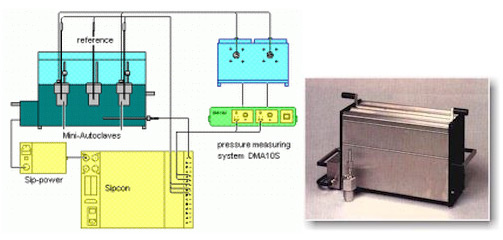This test is designed to determine the lowest temperature at which a substance or reaction mixture shows an exothermic reaction under defined isochoric conditions, while the pressure is measured.
The test is applied to products or reaction mixtures with low boiling points in order to suppress evaporation effects in the temperature range of interest.
The substance to be tested and graphite powder as reference are heated up at a linear rate of 2.5°C/min. (dynamic test). The temperatures of the samples are recorded. An exothermic reaction is considered to have occurred if the temperature curve of the test sample rises above the reference sample temperature. Alternatively, a series of isothermal tests is performed at temperature intervals of 10°C. As the test result, the highest temperature is reported at which no overheating of the sample is observed for 8 hours.

